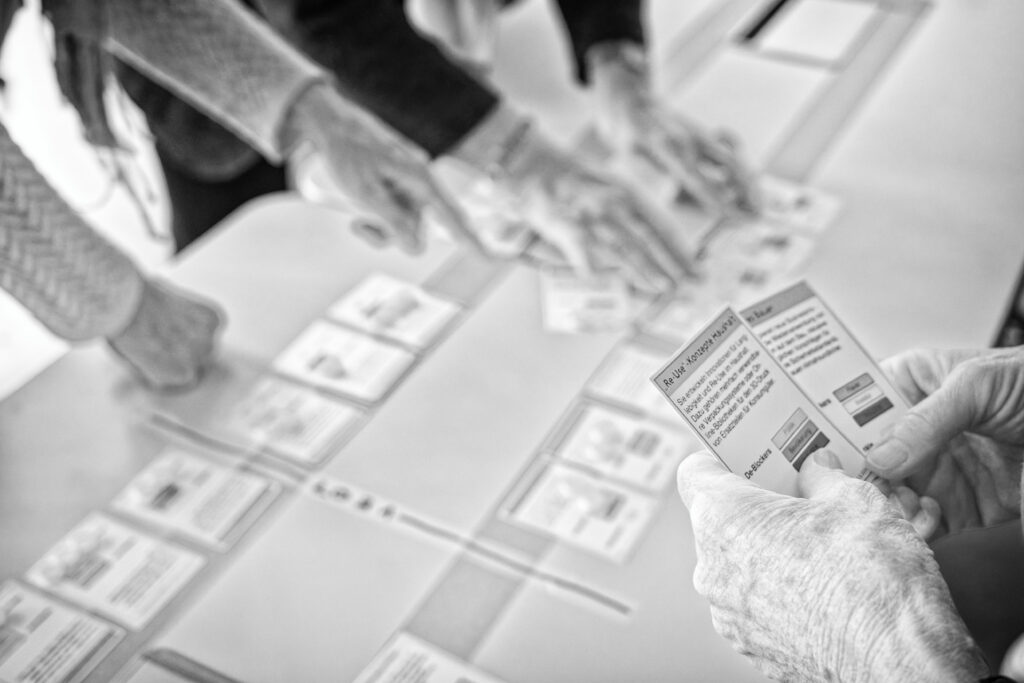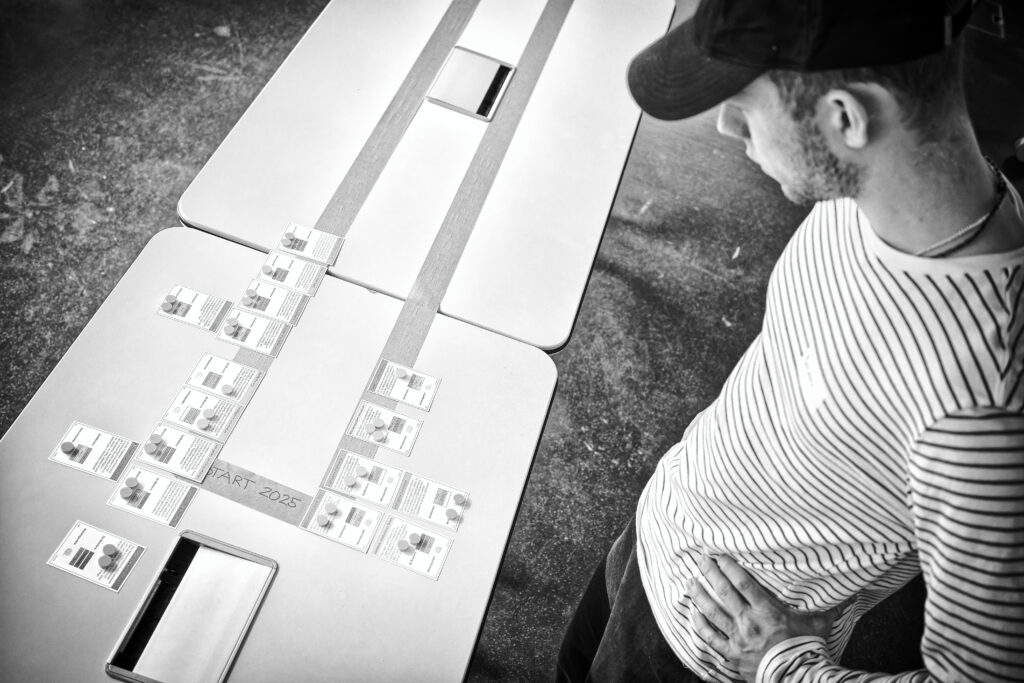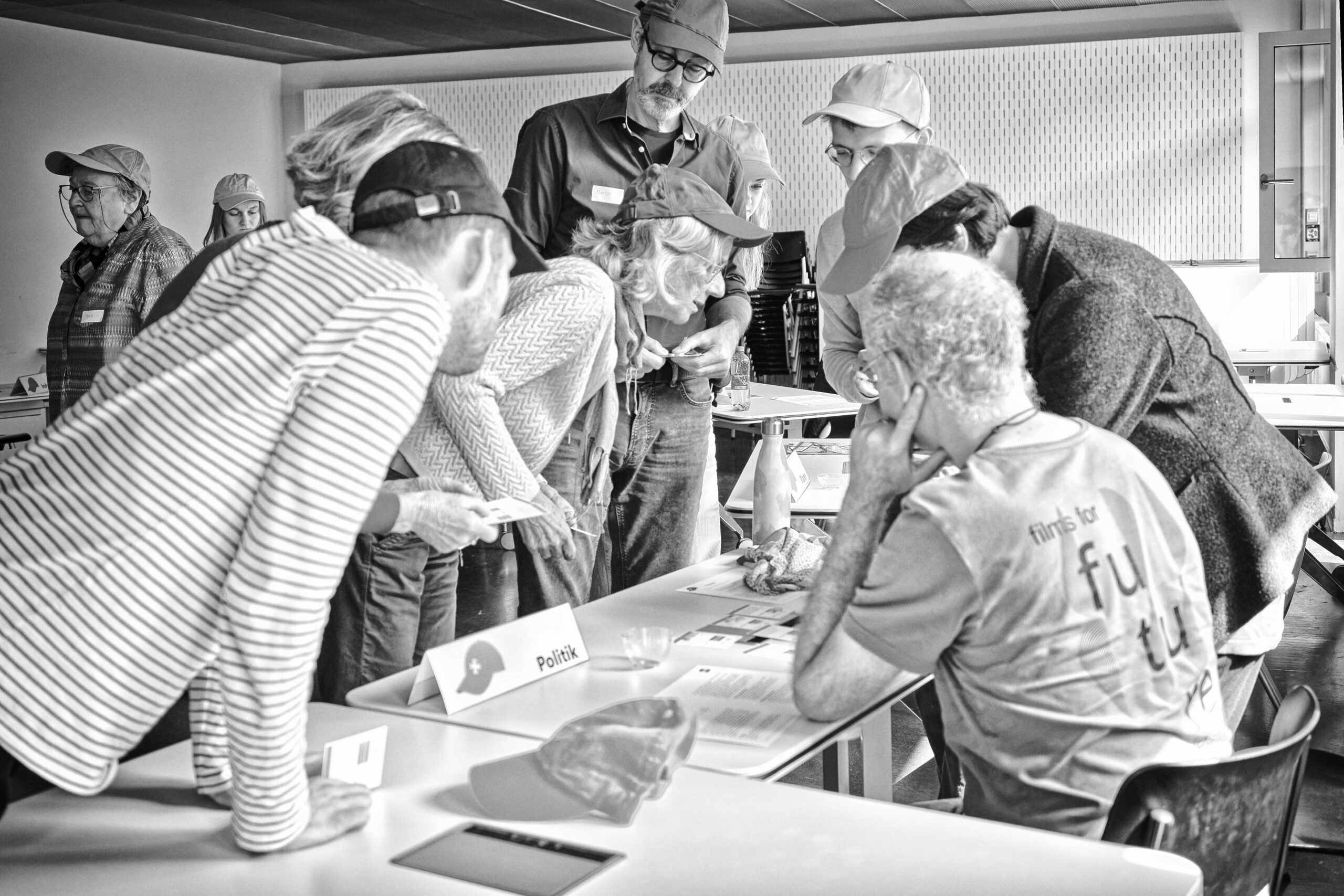image above: Negotiations during the PostFossilCities Workshop in Zürich, 2025, Jan Eckert.
Cross-sector collaboration is key to climate action — my experience with the PostFossilCities simulation game
Last Tuesday, 1 April, I had the opportunity to participate in a workshop on the PostFossilCities simulation game. Under the skilful guidance of facilitators Michaela Kuijvenhoven from Transformation Scout and Sabine Mehring from MehrNachhaltigkeit, our group of ten participants embarked on a four-hour journey at ETH Zurich to explore pathways to a post-fossil fuel society.
An innovative approach to climate strategy
The PostFossilCities simulation game creates an experimental space in which participants can explore the transformation towards Co2 emmission-neutral, post-fossil cities. What makes this game particularly valuable is its computer-based modelling, which provides immediate feedback on how our decisions affect territorial CO2 emissions in Switzerland. Our diverse group of players took on different roles representing key societal stakeholders – policy makers, citizens, industry representatives, investors, planners or innovators. Each role came with specific interests and a set of action cards detailing potential actions that could be taken either independently or in collaboration with other stakeholders.
The workshop was carefully structured in three phases
- Introduction phase: We were introduced to the concept of post-fossil cities and learned the rules and flow of the game.
- Simulation phase: We immersed ourselves in our roles, developing strategies, negotiating with other players, making decisions and analysing the results.
- Transfer phase: After the game, we reflected on our experiences and discussed how the lessons learned could be applied to our professional and personal contexts.

image above: Collaboration across sectors is key, 2025, Jan Eckert.
Real-time Feedback
What I found particularly motivating was the real-time feedback provided by the integrated simulation model: a territorial model of CO2 emissions in Switzerland, including sectors such as the built environment, transport, food, industry or general consumption. As time relentlessly progressed in the game, after each round we could monitor whether our collective actions were putting us on track to meet climate targets. This time-accelerated format effectively communicated the urgency of implementing effective climate action without delay.
The power of collaboration
Perhaps the most important lesson to emerge from the game was the discovery of how powerful collaborative action can be. As in real life, players who tried to implement actions alone risked losing ‘power’, while those who formed alliances gained momentum. The game elegantly demonstrates that tackling climate challenges requires cooperation across all sectors of society.
A beacon of hope
Our experience culminated in an encouraging revelation: it is still possible to take climate action on a scale that will help us avoid catastrophic consequences for our species and others. The key lies in fostering cooperation between all stakeholders and sectors through timely and effective action.
The PostFossilCities game is versatile enough to be relevant to different audiences, including politicians, urban planners, business leaders, students and engaged citizens. Its generic nature allows for flexible adaptation to different focus areas, debriefing methods and follow-up activities, depending on the audience and context.

image above: the post-fossil city roadmap is growing 2025, Jan Eckert.
For anyone interested in exploring climate strategies, understanding stakeholder dynamics or experiencing the urgency of climate action first hand, I would highly recommend the PostFossilCities simulation game. The welcoming atmosphere, excellent facilitation and comprehensive background information make it an invaluable learning experience that goes beyond traditional discussion formats.
This experience reminded me of another powerful climate simulation tool I’ve explored before – the Climate Fresk developed in France. While the Climate Fresk focuses on building collective understanding of climate science and cause-and-effect relationships, PostFossilCities takes the next step by simulating pathways for action. You can read about my experience with the Climate Fresk here.
This experience has been particularly relevant to our work at nominute.city, reinforcing our understanding that urban transformation requires both cross-sectoral collaboration and a deep appreciation of the temporal dimensions of change. The lessons learned will undoubtedly inform our ongoing research into alternative urban temporalities and post-efficiency paradigms.

